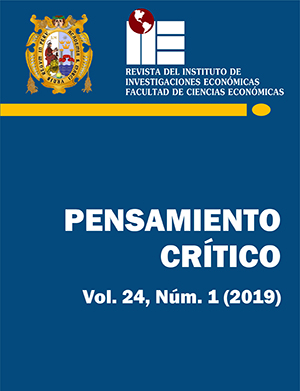Views of the contemporary crisis: Great Recession 2008-2009
DOI:
https://doi.org/10.15381/pc.v24i1.16562Keywords:
Great Recession; financial system; financial crisis; regulation; financializationAbstract
In this paper we study the causes of the origin of the crisis 2008-2009, from three theoretical positions. First, economic history, whose approach helps to contextualize the change of model from a Benefactor State to a Neoliberal State. Historians consider that the dynamics of the neoliberal period refers to a long-horizon event according to post-crisis actions and because there are no viable alternative paths against the theory that strives for freedom at all costs.Second, from conventional economic theory the main cause of the crisis was the lack of market mechanisms to regulate economic activity; position that is opposed to a heterodox approach: State must intervene in economic processes. Finally, the Marxist Political Economy studies the facts from a relatively recent category, financialization, where the accumulation model is based on finance. The financial sector extends to almost all sectors of economic life and this overwhelming penetration has contributed to the fragility of the system. The objective is to make a reading of the different approaches, together, to better understand the phenomenon under study.
Downloads
Published
Issue
Section
License
Copyright (c) 2019 Jesús Lechuga Montenegro, Faustino Vega Miranda

This work is licensed under a Creative Commons Attribution-NonCommercial-ShareAlike 4.0 International License.
THE AUTHORS RETAIN THEIR RIGHTS:
a. The authors retain their trademark and patent rights, and also on any process or procedure described in the article.
b. The authors retain the right to share, copy, distribute, execute and publicly communicate the article published in Pensamiento Crítico (for example, place it in an institutional repository or publish it in a book), with recognition of its initial publication in Pensamiento Crítico.
c. The authors retain the right to make a subsequent publication of their work, to use the article or any part of it (for example: a compilation of their works, notes for conferences, thesis, or for a book), provided they indicate the source of publication (authors of the work, journal, volume, number and date).






